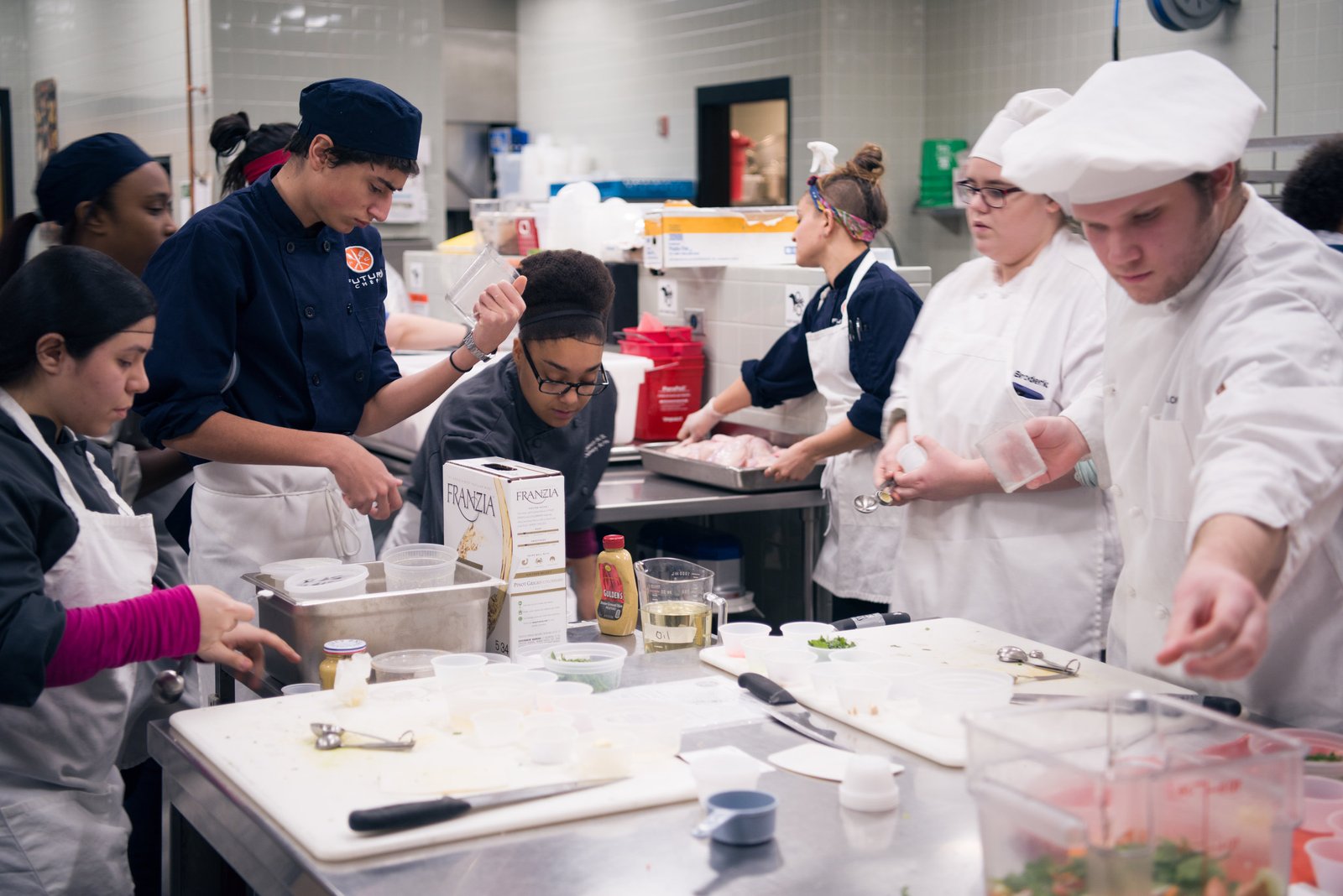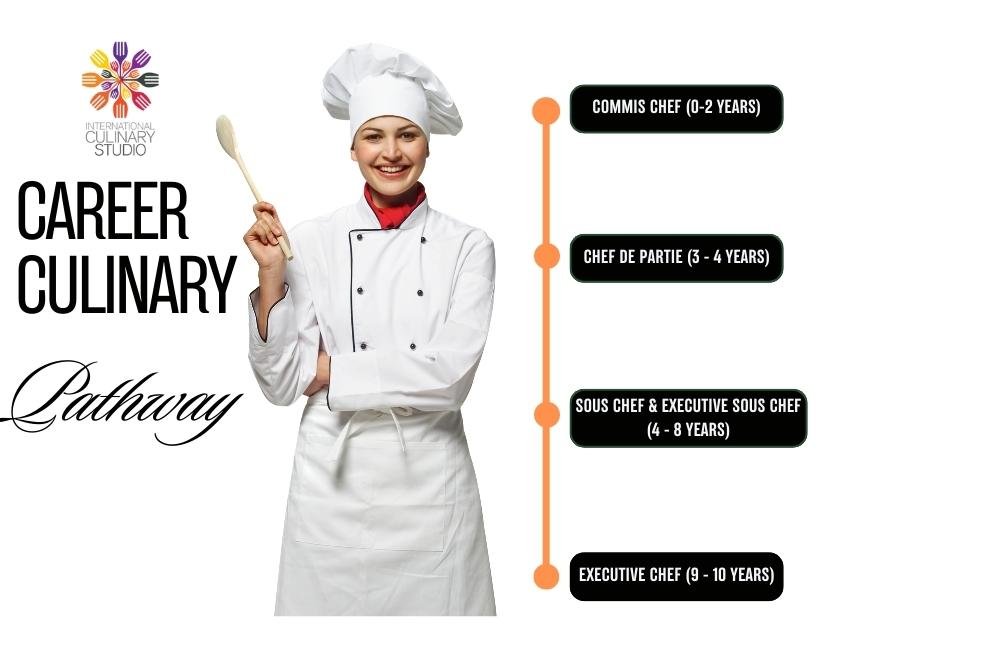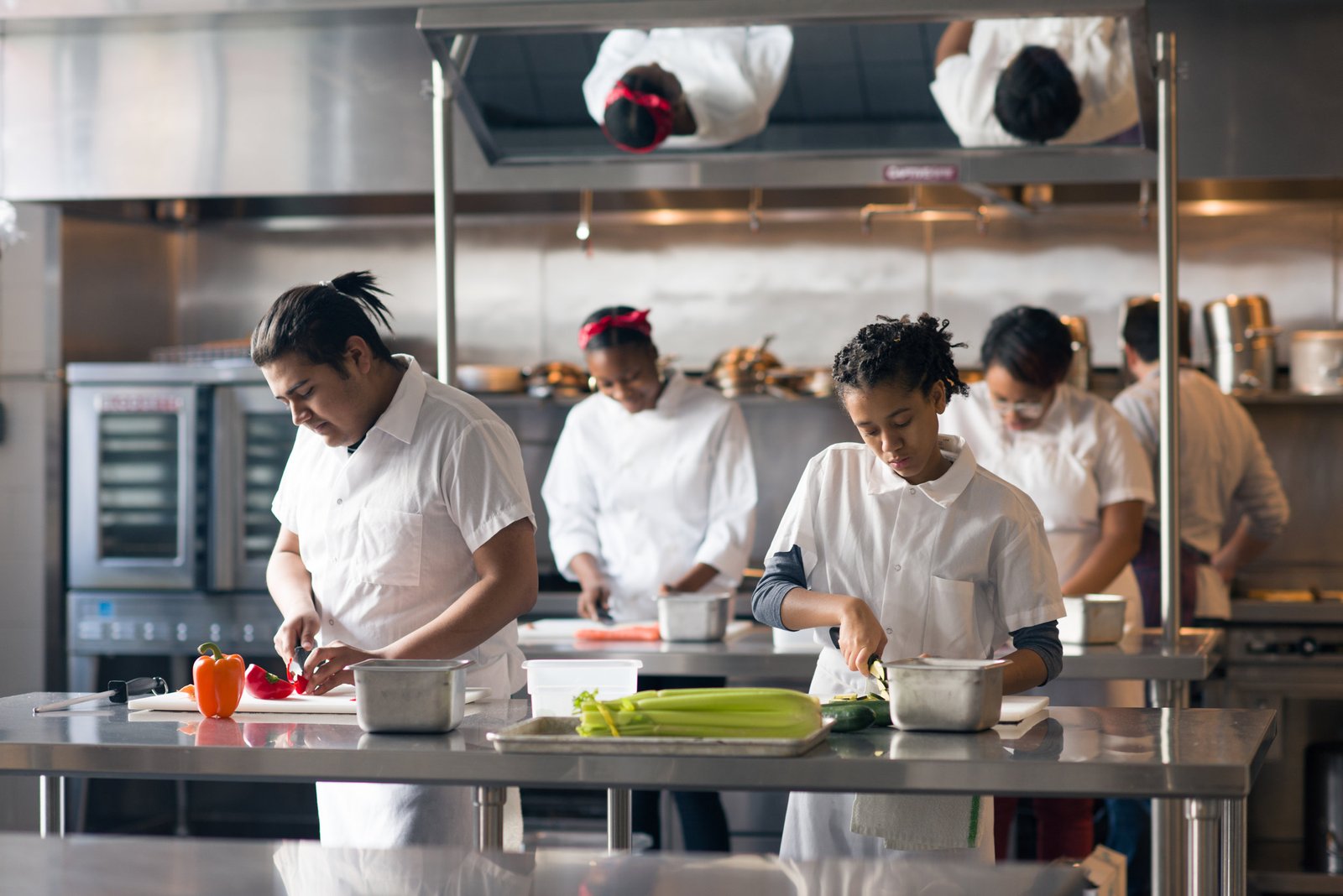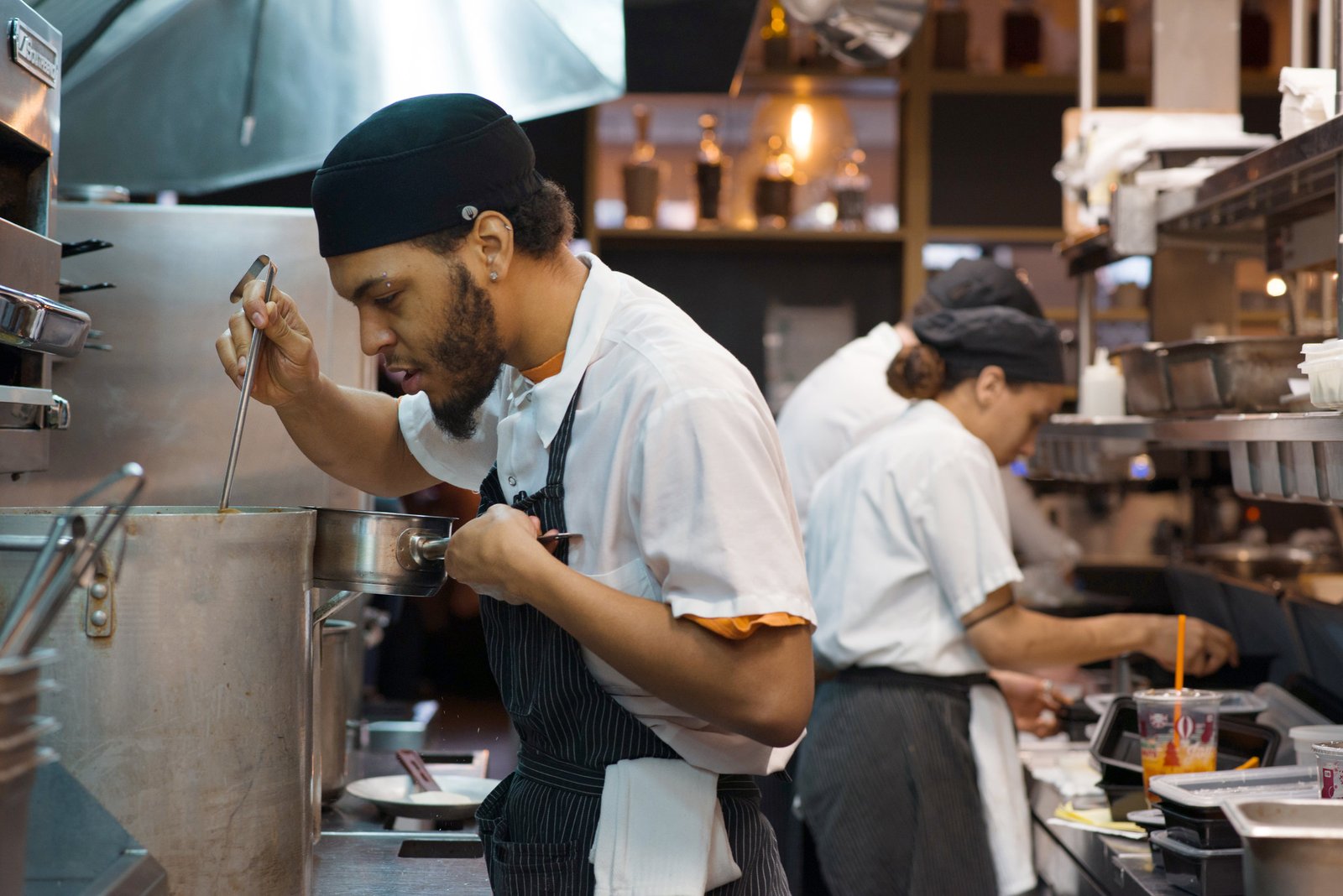Are you a budding chef with a passion for the culinary arts? If so, you’re in for an exciting journey as we explore the world of cooking and the wide-ranging opportunities it offers. In this article, we will take a look at the various aspects of a career in the culinary field, with a particular focus on students considering a career in the United States. From the thrill of creating delicious dishes to the challenges of running a kitchen, this career overview will provide valuable insights into what it takes to succeed as a chef. So grab your apron and get ready to embark on a flavorful adventure!

This image is property of images.squarespace-cdn.com.
1. Education and Training
1.1 Culinary School
If you’re dreaming of becoming a chef, attending culinary school can be an excellent starting point. Culinary schools offer specialized programs that provide a comprehensive education in various aspects of cooking and culinary arts. These programs typically cover culinary techniques, food safety and sanitation, nutrition, menu planning, and management skills. Attending a culinary school can give you a solid foundation and the necessary knowledge and skills to excel in the culinary world.
1.2 Apprenticeship
Another avenue to consider is an apprenticeship. Apprenticeships provide a unique opportunity to learn on the job while working alongside experienced chefs. Many culinary schools have partnerships with restaurants and other culinary establishments, making it easier for students to find apprenticeship opportunities. Apprenticeships allow you to gain practical experience, refine your skills, and learn from seasoned professionals in real-life kitchen settings.
1.3 On-the-Job Training
For those who prefer a more hands-on approach, on-the-job training can be a great option. Many aspiring chefs start their culinary journey by working as kitchen assistants or line cooks in restaurants. This hands-on training allows you to learn the ins and outs of the culinary field while gaining valuable experience in a fast-paced environment. While on-the-job training doesn’t provide formal education, it offers a practical way to acquire the skills and knowledge needed to excel in the industry.
2. Types of Chefs
2.1 Executive Chef
The executive chef is often seen as the pinnacle of the culinary profession. They are responsible for overseeing the entire culinary operation of a restaurant or food establishment. Executive chefs create and plan menus, manage kitchen staff, maintain food quality and safety standards, and ensure the smooth operations of the kitchen. This role requires a strong combination of culinary skills, leadership abilities, and business acumen.
2.2 Sous Chef
The sous chef is the second-in-command in a kitchen and plays a crucial role in supporting the executive chef. Sous chefs assist in menu planning, supervising kitchen staff, coordinating food preparation, and ensuring that dishes are prepared to the highest standards. This role requires excellent organizational skills, attention to detail, and the ability to multitask effectively.
2.3 Pastry Chef
Pastry chefs specialize in creating delectable desserts, pastries, and baked goods. They are skilled in the art of creating intricate and visually appealing desserts, as well as balancing flavors and textures. Pastry chefs work in various settings, including restaurants, hotels, and bakery shops. This role demands creativity, precision, and a deep understanding of baking techniques.
2.4 Personal Chef
A personal chef is a chef who provides customized culinary services to individual clients. Personal chefs work closely with their clients to create personalized menus, shop for ingredients, and prepare meals in the clients’ homes. This role requires exceptional culinary skills, adaptability to different dietary preferences, and the ability to work independently.
2.5 Research and Development Chef
Research and development chefs are responsible for creating new and innovative recipes and food products. They work in food manufacturing companies, culinary research labs, and test kitchens. Research and development chefs experiment with ingredients, techniques, and flavor combinations to create unique and marketable food products. This role demands a strong understanding of culinary science, creativity, and a passion for culinary exploration.
2.6 Private Chef
Private chefs cater to the culinary needs of individuals or families in private homes or estates. They design personalized menus, prepare meals, and often cater to specific dietary requirements or restrictions. Private chefs must be adaptable and versatile, as they need to accommodate the tastes and preferences of their clients on a daily basis.
2.7 Catering Chef
Catering chefs specialize in catering events such as weddings, parties, and corporate functions. They are responsible for planning and executing the menu, coordinating with event planners, managing kitchen staff, and ensuring that the food is delivered in a timely and professional manner. Catering chefs must have excellent organizational skills, the ability to work under pressure, and a talent for creating large-scale culinary masterpieces.
2.8 Restaurant Chef
Restaurant chefs oversee the culinary operations of a restaurant. They manage the kitchen staff, create and update menus, ensure food quality and consistency, and often collaborate with the front-of-house team to provide an exceptional dining experience. Restaurant chefs must have a strong culinary background, leadership skills, and the ability to thrive in a fast-paced environment.
2.9 Food Stylist
Food stylists play a crucial role in the culinary industry, particularly in food photography, advertisements, and television productions. They are responsible for making food look visually appealing and enticing through careful arrangement, presentation, and styling. Food stylists must have a keen eye for aesthetics, attention to detail, and a deep understanding of food photography techniques.
2.10 Test Kitchen Chef
Test kitchen chefs work in culinary research and development, recipe testing, and food publications. They develop, test, and refine recipes for cookbooks, magazines, food blogs, and culinary publications. Test kitchen chefs have a passion for recipe creation and experimentation, along with strong organizational skills and attention to detail.

This image is property of www.internationalculinarystudio.com.
3. Job Opportunities
3.1 Restaurants and Fine Dining Establishments
Restaurants, especially fine dining establishments, offer numerous job opportunities for chefs. In these settings, chefs have the opportunity to showcase their culinary skills, create innovative dishes, and provide memorable dining experiences for patrons. Working in a restaurant environment allows chefs to collaborate with other professionals, learn from experienced chefs, and gain exposure in the culinary industry.
3.2 Hotels and Resorts
Hotels and resorts often have multiple dining establishments, including restaurants, cafes, and in-room dining services. Chefs working in hotels and resorts have the opportunity to work in various culinary settings and cater to a diverse range of guests. These environments provide chefs with the chance to work with high-quality ingredients, serve a wide array of cuisines, and gain valuable experience in different aspects of the culinary field.
3.3 Cruise Ships
For those seeking a unique culinary experience, working on a cruise ship can be an exciting opportunity. Cruise ship chefs work in state-of-the-art kitchens and have the chance to travel to different destinations while honing their culinary skills. Cruise ship kitchens cater to a large number of guests and offer chefs the chance to work in a fast-paced environment and serve a variety of international cuisines.
3.4 Healthcare Facilities
Healthcare facilities such as hospitals, nursing homes, and rehabilitation centers also employ chefs to provide nutritious and delicious meals for patients, residents, and staff. Working in a healthcare facility requires chefs to have a strong understanding of dietary restrictions, allergies, and special nutritional requirements. This sector offers a rewarding experience for chefs who are passionate about using their culinary skills to contribute to the well-being of others.
3.5 Food Manufacturing and Processing Companies
Chefs can also find job opportunities in food manufacturing and processing companies. These companies often require chefs to develop and test recipes, create product lines, and ensure that the food products meet quality and safety standards. Working in this sector allows chefs to combine their culinary skills with food science and technology, as well as contribute to the creation of innovative food products.
3.6 Private Dining
Private dining has become increasingly popular, providing chefs with the opportunity to cater exclusive events, parties, and gatherings in private residences or venues. Working in private dining allows chefs to create personalized menus, showcase their creativity, and provide a customized culinary experience for clients. This sector offers chefs the chance to work closely with clients and establish long-term relationships.
3.7 Television and Media
Television and media offer unique opportunities for chefs to showcase their skills and gain recognition on a national or even international level. Chefs can appear as contestants on cooking competitions, host their own cooking shows, or work as culinary experts in media outlets. Television and media work allows chefs to share their passion for food with a broad audience and establish their brand as culinary professionals.
4. Skills Required
4.1 Culinary Skills
Culinary skills are the foundation of a successful career in the culinary industry. Chefs must have a strong understanding of various cooking techniques, knife skills, flavor combinations, and the ability to create balanced and visually appealing dishes. Developing and refining culinary skills is an ongoing process, and chefs are expected to continuously expand their knowledge and expertise in their craft.
4.2 Creativity
Creativity is an essential skill for chefs, as it allows them to experiment with ingredients, develop innovative recipes, and present food in an artistic and visually appealing manner. Chefs need to think outside the box, explore new flavor combinations, and adapt to culinary trends while still maintaining their unique style and culinary identity.
4.3 Time Management
Time management is crucial in a fast-paced kitchen environment. Chefs need to be able to prioritize tasks, work efficiently, and meet deadlines, especially during busy service times. Effective time management ensures that food is prepared and served in a timely manner, maintaining the flow and rhythm of the kitchen.
4.4 Attention to Detail
Attention to detail is a fundamental quality for chefs, as precision is essential in creating high-quality dishes. Chefs must pay close attention to ingredient quality, measurements, cooking times, plating techniques, and overall presentation. This meticulous attention to detail ensures that every dish meets the highest standards of taste, texture, and visual appeal.
4.5 Physical Stamina
Working in a kitchen can be physically demanding, requiring chefs to stand for long periods, lift heavy pots and pans, and work in high-temperature environments. Physical stamina is crucial for chefs to withstand the physical challenges of the job and maintain a high level of performance throughout the workday.
4.6 Leadership and Management Skills
As chefs progress in their careers, strong leadership and management skills become increasingly important. Executive chefs and sous chefs are responsible for leading and supervising kitchen staff, ensuring teamwork, and maintaining a harmonious work environment. Effective leadership and management skills help chefs inspire their teams, delegate tasks efficiently, and achieve operational excellence.
4.7 Communication Skills
Communication is a vital skill for chefs, as it allows them to effectively convey instructions and coordinate with other kitchen staff. Clear and concise communication ensures smooth operations, timely preparation, and efficient teamwork in the kitchen. Good communication skills also extend to interacting with front-of-house staff, suppliers, and clients.
4.8 Business Acumen
In addition to culinary skills, chefs must have a strong sense of business acumen. Chefs who aspire to become executive chefs or open their own culinary businesses need to understand food costs, budgeting, menu planning, and financial management. Awareness of industry trends, customer preferences, and marketing strategies is also essential for success in a competitive culinary landscape.

This image is property of images.squarespace-cdn.com.
5. Salary and Benefits
5.1 Average Salary
Salaries in the culinary industry vary depending on factors such as experience, location, and job position. Executive chefs, sous chefs, and specialized chefs often earn higher salaries compared to entry-level positions. According to the U.S. Bureau of Labor Statistics, the median annual wage for chefs and head cooks was $51,530 as of May 2020. However, it’s important to note that salaries can vary significantly, and top chefs in renowned restaurants or establishments can earn considerably higher incomes.
5.2 Benefits
Benefits for chefs can vary depending on the employer. Some common benefits include health insurance, retirement plans, paid time off, and employee discounts on dining or culinary products. Additionally, chefs may enjoy the perk of tasting their own culinary creations and having access to premium ingredients and culinary resources.
5.3 Career Advancement Opportunities
The culinary industry offers a range of career advancement opportunities for chefs who aspire to take their careers to the next level. With experience and skill development, chefs can progress from entry-level positions to more specialized roles, such as executive chef or pastry chef. Additionally, chefs can explore opportunities in consulting, teaching, culinary research, writing cookbooks, or even opening their own restaurants or culinary businesses.
6. Work Environment
6.1 Kitchen Settings
Kitchens can vary greatly depending on the type of establishment and the culinary style. They can range from small, intimate kitchens in fine dining restaurants to large, bustling kitchens in hotels or catering companies. Kitchen settings can be fast-paced, intense environments where teamwork and coordination are essential for smooth operations. Chefs must be comfortable working in close quarters, adapt to different kitchen layouts, and thrive in high-pressure situations.
6.2 Stressful Conditions
Working in a kitchen can be demanding and stressful. Chefs often face time constraints, intense workloads, and high expectations for excellence. The fast-paced nature of the job requires chefs to stay calm under pressure, think quickly on their feet, and maintain focus even in stressful situations. The ability to handle stress effectively is crucial for chefs to thrive in their roles and deliver exceptional culinary experiences.
6.3 Long and Irregular Working Hours
Chefs often work long hours, including nights, weekends, and holidays. The culinary industry is known for its irregular schedules, as chefs need to be available during peak dining times and have the flexibility to accommodate the demands of the business. Chefs must be prepared for a work-life balance that may differ from traditional 9-to-5 jobs, as the culinary world operates based on the needs and schedules of the industry.

This image is property of images.squarespace-cdn.com.
7. Job Outlook
7.1 Industry Growth
The culinary industry continues to experience growth, driven by factors such as increased dining out, culinary tourism, and the popularity of cooking shows and food media. The demand for unique dining experiences and a variety of cuisines contributes to a positive job outlook for chefs.
7.2 Demand for Skilled Chefs
The demand for skilled chefs remains high, particularly for those with a combination of culinary skills, creativity, and leadership abilities. Restaurants and establishments are consistently seeking talented chefs who can create memorable dishes and deliver exceptional culinary experiences to their patrons.
7.3 Job Prospects
While competition can be fierce in the culinary industry, skilled and passionate chefs can find a range of job opportunities. Job prospects may vary by location and the type of establishment, but chefs who have honed their skills, built a strong culinary portfolio, and established connections within the industry have a higher chance of success.
8. Culinary Competitions
8.1 Prestigious Culinary Competitions
Prestigious culinary competitions provide chefs with a platform to showcase their skills, gain recognition, and learn from other industry professionals. Competitions such as the Bocuse d’Or, Worldchefs Global Chefs Challenge, and Culinary Olympics attract talented chefs from around the world, challenging them to push their culinary boundaries and compete at the highest level.
8.2 Benefits of Participating
Participating in culinary competitions can offer numerous benefits to chefs. Competitions provide a valuable learning experience, as chefs have the opportunity to observe and learn from other participants’ techniques and approaches. Competing also allows chefs to receive feedback from expert judges, helping them refine their culinary skills and understanding of their craft. Additionally, winning or placing in prestigious competitions can enhance a chef’s reputation, career prospects, and opportunities for collaborations or endorsements.
8.3 Networking Opportunities
Culinary competitions bring together chefs, industry professionals, and culinary enthusiasts, creating networking opportunities in a supportive and competitive atmosphere. Networking at culinary competitions allows chefs to build connections, forge relationships with potential employers or mentors, and stay informed about the latest culinary trends and advancements. Establishing a strong network within the industry can open doors to new career opportunities and collaborations.
This image is property of lh3.googleusercontent.com.
9. Professional Organizations
9.1 American Culinary Federation (ACF)
The American Culinary Federation is a professional organization that promotes the culinary arts and supports culinary professionals across the United States. The ACF offers certifications, educational programs, competitions, and resources for chefs at all stages of their careers. By joining the ACF, chefs can connect with like-minded professionals, access continuing education opportunities, and stay updated on industry developments.
9.2 International Association of Culinary Professionals (IACP)
The International Association of Culinary Professionals is a global network of culinary professionals, including chefs, cooks, food writers, and educators. The IACP offers various resources, publications, conferences, and networking opportunities for its members. Joining the IACP allows chefs to expand their professional network, gain access to industry insights, and stay connected with the global culinary community.
9.3 Les Dames d’Escoffier International (LDEI)
Les Dames d’Escoffier International is an organization that supports and promotes women in the culinary professions. LDEI provides scholarships, mentorships, and networking opportunities for women chefs, restaurateurs, sommeliers, and other culinary professionals. Becoming a member of LDEI allows women in the culinary industry to connect with peers, access educational resources, and benefit from the support of a global community.
9.4 Women Chefs & Restaurateurs (WCR)
Women Chefs & Restaurateurs is an organization dedicated to promoting and advancing women in the culinary industry. WCR offers mentorship programs, scholarships, educational events, and networking opportunities designed to empower women in culinary leadership roles. Joining WCR provides chefs with a platform to connect with influential women in the industry, gain access to career development resources, and advocate for gender equality in the culinary world.
9.5 Culinary Institute of America Alumni Network
The Culinary Institute of America (CIA) has a vast alumni network that offers support and networking opportunities for graduates. The CIA Alumni Network provides access to job boards, mentorship programs, industry events, and resources for professional development. Connecting with the CIA alumni network allows chefs to tap into a network of respected culinary professionals and benefit from ongoing support and guidance.
10. Career Development and Advancement
10.1 Continuing Education and Specialization
Continuing education is crucial for chefs to stay updated on the latest culinary trends, techniques, and advancements in the industry. Chefs can pursue specialized certifications, attend workshops and seminars, or enroll in advanced culinary programs to enhance their skills and knowledge. By continuously investing in education and specialization, chefs can position themselves for career advancement and stay competitive in the ever-evolving culinary landscape.
10.2 Networking and Mentorship
Networking and mentorship play a significant role in career development for chefs. Building relationships with industry professionals, joining professional organizations, and seeking mentorship opportunities can offer guidance, insights, and potential career openings. Through networking and mentorship, chefs can gain valuable advice from experienced professionals, receive recommendations, and access hidden opportunities within the industry.
10.3 Opening a Culinary Business
For chefs with an entrepreneurial spirit, opening their own culinary business can be a rewarding career path. Whether it’s a restaurant, catering service, food truck, or specialty food shop, starting a culinary business requires careful planning, financial management, and a deep understanding of the market and target audience. Opening a culinary business allows chefs to showcase their unique culinary vision, express their creativity, and build a brand based on their own culinary identity.
10.4 Establishing a Personal Brand
In the increasingly competitive culinary industry, establishing a personal brand can set chefs apart and create opportunities for career advancement. Building a personal brand involves showcasing culinary expertise, unique style, and culinary philosophy through social media, blogs, appearances in media outlets, and collaborations with fellow professionals. Creating a strong personal brand allows chefs to attract a dedicated following, gain recognition, and open doors to exciting career opportunities.
10.5 Pursuing Michelin Stars and Culinary Awards
For many chefs, achieving Michelin stars and culinary awards represents the pinnacle of professional success. Michelin stars are prestigious accolades awarded to restaurants based on strict criteria, including the quality of ingredients, culinary techniques, and overall dining experience. Pursuing Michelin stars and culinary awards requires exceptional culinary skills, unwavering commitment, and the ability to consistently deliver extraordinary culinary experiences. These accolades can elevate a chef’s career, attract international acclaim, and establish them as leaders in the culinary field.
In conclusion, the culinary industry offers an exciting and diverse range of career opportunities for aspiring chefs. Whether you choose to attend culinary school, pursue an apprenticeship, or gain hands-on experience, the culinary world is full of possibilities for those driven by passion and creativity. With the right education, skills, and dedication, you can embark on a fulfilling career journey, explore different culinary paths, and make your mark in the ever-evolving culinary landscape.